On weak-legged plastic chairs under the partial shade of one of the schoolyard’s two vast acacia trees, there is a lot of counting on fingers going on.
Their children might be well beyond basic maths now at Likwenu secondary, but these mothers, sharp as they are, have had little experience of formal arithmetic; there’s rarely money around to count.
Eventually there is murmured agreement and Molley Kalino, chair of the mothers’ support group at the school, deep in the countryside of southern Malawi, speaks up: “So a small field in a good year will bring you in 10 50kg bags of maize – six or seven in a bad year.
“Maize fetches around 5,000 Malawian kwacha (£7.50) a bag. School is 5,500 kwacha (£8.35) a term, three terms a year, and the uniform is 4,000 kwacha (£6),” she said. Not all the maize can be sold, the family has to eat, and then there is the cost of fertiliser to boost the poor, overburdened soil, she adds.
Digging into incomes and outgoings at such a level only increases the bafflement over how their families survive at all. Kalino clicks her tongue: “You do what you can, take any work that’s going, a day here and there. You get to the crops when you can, you see to the children, keep them clean, keep them fed.”
One meal a day is normal, and empty stomachs mean that working in the homes and fields is tough. Which makes what is happening here all the more extraordinary. In the schools scattered around this district there is a radical shift going on. Communities are turning around the huge school dropout rates that have kept rural people bedded down in poverty, especially among the girls. Several primary schools are boasting a zero dropout rate, down from 30-40%.
Like many developing countries, Malawi has had a poor record of keeping children in school and has one of the world’s highest rates of underage marriage – a curse that entrenches cycles of poverty, inequality and ill health.
Statistics show that girls who give birth before the age of 15 are five times more likely to die in childbirth. This month Malawi showed a commitment to change by raising the age when a girl can be married with parental consent from 15 to 18, and the government is pouring a quarter of its spending into education.
Outside agencies have come in to build schools here, but as the 2010 collapse of Madonna’s much-hyped girls’ academy project in Malawi showed, top-down efforts can fail amid crucial misunderstandings between locals and well-meaning foreigners.
“I regret a lot,” said Kalino. “I left school aged 11. Then soon I was married. But not for this one,” she said, hugging her daughter, Funny. “The economics are clear: marry a daughter and she goes away, put her through school and she is happy, independent and she will be able to help the family.”
Funny has had the same school uniform, a blue blouse and maroon skirt, for five years. Will it be passed down to her younger sister? “No, no, she’ll keep it for everyday wearing when she leaves school,” said Kalino.
A set of clothes, worn as they are, are hung on to by people whose possessions are so few that most have barely a sleeping mattress inside the boxy little clay-brick houses, with unglazed windows covered by scraps of cardboard or old election posters – the only things politicians ever bring here.
They have to be frugal, living off maize porridge supplemented now and again by wild-growing vegetables in the fields – patches of rich red soil that turn from mud to dust with the seasons.
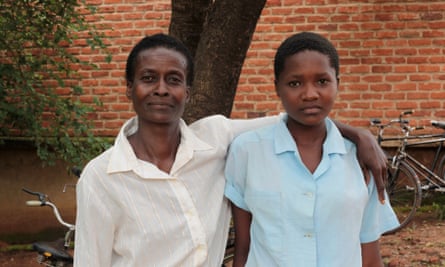
Yet the women here are tending not only their own families and land, but twice a week are giving up a morning to the field that the local chief has put aside for the school. They grow maize to make porridge for the school, because they know that by feeding the children they can keep them in the classroom.
The group wants to put paid to the notion that girls have not been educated in the past because of culture or tradition or religion. “It’s because of poverty,” said a mother of six, Barbra Makwinja. “So now we want to fight back. I don’t want my daughters to be like me, to farm. So now we work the school’s maize field to feed all the children because then they will go to school. We come into school and we talk to the girls when they are in trouble. We explain to them it’s important they stay at school.”
It’s not easy for the children either. Limbani Enock, 14, sits shyly picking at the frayed edges of a sleeping mat outside her hut, whose back wall was washed away in the rains that caused last month’s flooding that killed nearly 200 people and destroyed thousands of acres of crops across the country.
Limbani is the first in her extended family, in her village, to go to secondary school. She has won a scholarship from the charity Camfed (the Campaign for Female Education), and hopes it will take her all the way to college. So every morning she gets up at 4am, does her chores, washing and sweeping, before setting off on her 90-minute walk to be at Likwenu by 7.30am. Asked if she ever wakes up, looks ahead to her long trek and thinks “not today”, Limbani replies with a scandalised “No!”
The other kids shout at her, asking: “Why are you going so far?” Boys chase alongside and harass her as she passes. “Mostly I think about schoolwork, about maths problems when I’m walking. I want to be an accountant,” says Limbani.
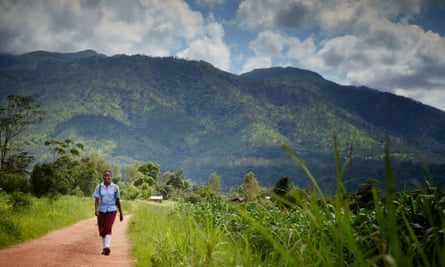
In Liwonde schools have been recruiting parents to join mothers’ and fathers’ groups and encourage their children to stay in the classroom and to tolerate the lack of help in the fields that a child not in school would bring, to run shifts at the feeding programmes and to invest the little they have in the future.
“The change has come to this place because the parents can see that if they educate girls it is an investment. We are very proud to have stopped dropouts. Even the crime rate is down, so now I have less to do, I am a free man!” joked Nkalo Nkula, the traditional chief for some 10 villages in Liwonde district.
This district is going further than the government. “We have just agreed some bylaws. We are fining these men who get girls pregnant and force them out of school,” said Nkula. “We will arrest them and punish them. Our girls need to be in school. Yes, it is very hard for people to find the school fees. They have not cash crops here but food crops, and if you find money you think of the stomach. School is a luxury. But education is the future and people are opening their eyes. There is plenty of time to get married – many children used to be a blessing; now many children means poverty.”
Aid work has come and gone here; outsiders have brought in food or health clinics with various hits and misses. What is happening now feels different. Likwenu school is supported by Camfed, which is supporting many girls and schools. It does not own or run them, but it offers scholarships – a panel of local people shortlist the most deserving – and has been building kitchens for the all-important porridge-making.
There are 70 girls at Likwenu being supported by Camfed, which has committed to a long-term relationship with pupils, so much so that it insists that children sign up to be part of its alumni scheme – a cycle that brings school-leavers back to mentor younger girls.
Three 19-year-olds – Mervice Chombuk, Fatsileni Jafali and Asitatu Bamusi – are recent Likwenu graduates and Camfed alumni. They’ve come back, as agreed, to chat to the pupils – “to put back,” said Chombuk.
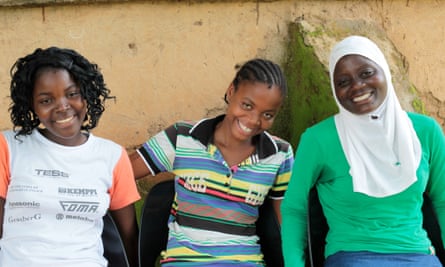
“I tell them, ‘don’t be tempted to leave school, don’t be tempted by the boys who shout at you and say you will never be married’,” she said. “It’s challenging to stay. It’s easy to drop out, but you will regret it for the rest of your life.”
All three are the first in their families’ living memory to set up and run their own businesses. Bamusi makes and sells toba, a non-alcoholic sugared beer; Jafali has a stall of snacks and is planning a business selling secondhand clothes; Chombuk makes and sells banana fritters. They have ambition and great plans. They insist that they won’t be getting married until they are in their mid-20s, a decade older than their mothers were.
It might seem a small step, but in fact it is a huge one. They are still vulnerable of course, still poor, but as Jafali said proudly: “I’m self-sustaining, I’m independent and I’m not a farmer. I help my family. Women can be police now, women can be soldiers. I feel my education was only the beginning.”
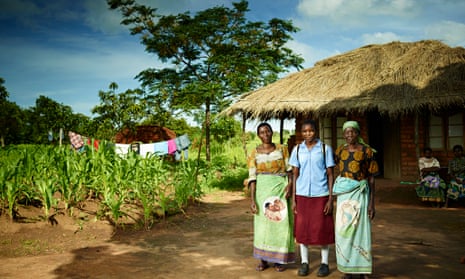
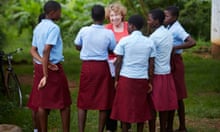




Comments (…)
Sign in or create your Guardian account to join the discussion